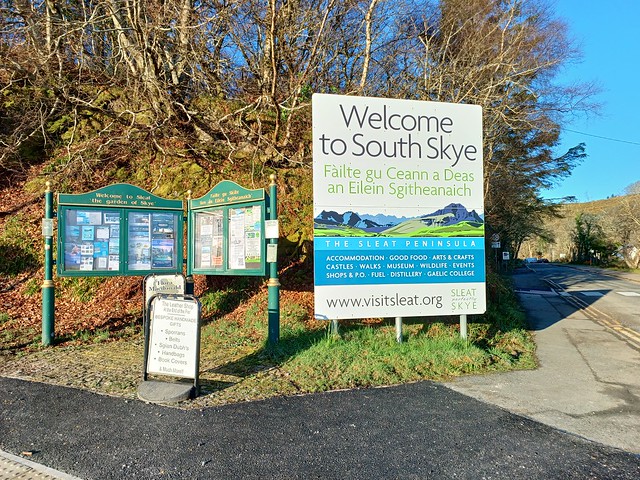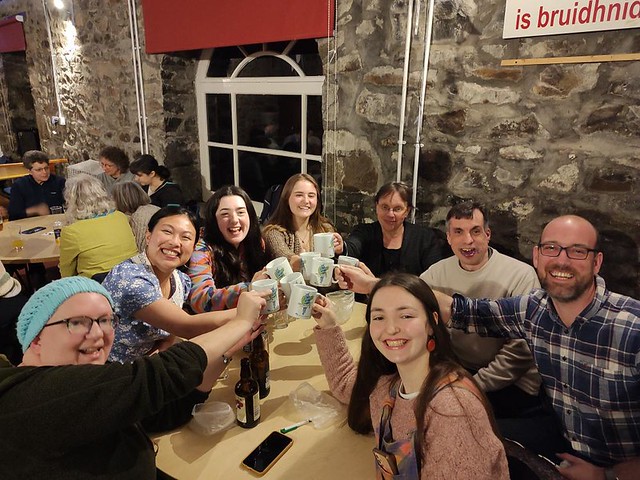Last week I was on holiday. I spent most of the time learning Scottish Gaelic songs at a college on the Isle of Skye, and stopped at my mum’s in Lancashire for a few days on the way back. I had a wonderful time, met some interesting people, and learnt some beautiful songs.
It was my 9th visit to the college since 2008 and certainly won’t be my last. When I first went there I used as much Scottish Gaelic as I knew, and filled in any gaps with Irish, which I speak more or less fluently. As the two languages are closely related, this sort of works, though differences in the pronunciation and meaning of words can lead to some misunderstandings.
Recently I’ve been learning a lot more Gaelic with Duolingo, and can now speak it fairly well. This makes understanding the songs easier, although they often use poetic and old-fashioned words that don’t usually appear in my lessons. As well as speaking Gaelic, I also spoke some Dutch, Japanese, Welsh and a bit of English.
Normally I try to add a certain number of pages to Omniglot each week, and to write blog posts, and make podcasts and videos. Last week I didn’t do any of that, apart from one Celtiadur post, and had a break from it all, which was great.
This got me thinking – do I really need to do so much every week? Did you miss the Adventure in Etymology last week, or the Celtic Pathways or Omniglot News podcast, or the new language and other pages that weren’t added to Omniglot? Were you aware of all of these?
Maybe I’ll start doing the Adventures in Etymology every other week, and alternating with the Celtic Pathways podcast.
Incidentally, here’s a little piece I wrote on the train from Glasgow to Mallaig. I was trying to write a train-related song, and came up with this. I haven’t thought of a tune for it yet.
The snake of steel
rattles and shakes
through steep glens
where eagles soar
past foaming fishpaths
where waterdogs play
through empty lands
where none do bide
to the ocean’s edge
where seals hide
and the water meets the sky
The threads of distraction
are loosened
and there’s time to see
beyond the wind’s eye
time to think and dream
to talk and rest
As the iron horse
clitters and clatters
Along the metal road
I’m also working on a song in Scottish Gaelic inspired by my lessons in Duolingo. It’s called Thoir an Aire (Watch out).
Thoir An Aire (Watch Out)
Seist (Chorus)
Thoir an aire, thoir an aire (Watch out, watch out)
Thoir an aire, tha Iain a’ tighinn (Watch out, Iain is coming)
Thoir an aire, thoir an aire (Watch out, watch out)
Tha Iain rùisgte is tha e a’ tighinn (Iain is naked and he’s coming)
Ghoid Màiri a drathais (Mairi stole his underpants)
Ghoid Màiri a briogais (Mairi stole his trousers)
Ghoid Màiri a geansaidh gorm is geal (Mairi stole his blue and white jersey)
Ghoid Màiri a lèine (Mairi stole his shirt)
Ghoid Màiri a brògan (Mairi stole his shoes)
Ghoid Màiri aodach Iain gu lèir (Mairi stole all his clothes)
Ruith air falbh, ruith air falbh (Run away, run away)
Ruith air falbh tha Iain a’ tighinn (Run away, Iain is coming)
Ruith air falbh, ruith air falbh (Run away, run away)
Tha guga aige is tha e a’ tighinn (He has salted gannet and he’s coming)
Càit bheil Calum? (Where is Calum?)
Càit a bheil Coinneach? (Where is Kenneth?)
Càit a bheil Ceiteag? (Where is Katie?)
Am faca tu iad? (Have you seen them?)
Càit a bheil Mairead? (Where is Margaret?)
Càit a bheil Mòrag? (Where is Morag?)
Ruith iad air falbh (They ran away)
oir tha Iain a’ tighinn (because Iain is coming)
All photos were taken by me. The videos are from the end-of-course cèilidh at SMO. I’m not sure who took them.



Hi Simon,
As for the question of how many pieces like Adventures in Etymology you need to do, you really need to gauge user interest. Maybe conduct an online poll? Since Omniglot has become your means of sustenance, you would behoove yourself to provide things that readers care about most, to maximize your web traffic. I personally only read these on occasion, as much of it I don’t understand or find hard to relate to. As you well know, my number one interest is in the New Languages articles, which I read and inspect with a fine-tooth comb (which you ALSO well know).
By the way, I am often amused at the (evidently European) custom of referring to all time taken off to go out and have fun as a “holiday” or that you have gone “on holiday”.
In the US, people don’t speak that way. Here, pretty much, a “holiday” is something religious, like Christmas, or time off dictated by national holiday, like Thanksgiving or Labor Day. When we just take time off from work to go somewhere and have fun, it’s a “vacation”. Generally, we don’t mix the two usages. Everyone seems to just know that, and no one gets confused by the two names.
By the way, since Skye is an island, how to you get there? Is there a ferry or something?
I got to Skye by ferry – it takes about 45 minutes. There is also a bridge that connects Skye to the mainland.
If there’s a bridge, why take a 45-minute ferry? For fun, or is there some issue with the bridge?
I could have taken the train to the Kyle of Lochalsh, where the bridge is, but the college is 20 miles from there, and there are no buses on Sundays. Armadale, where the ferry goes to, is only 2 miles from the college, so slightly more conventient. If I had a car, it wouldn’t make a big difference.